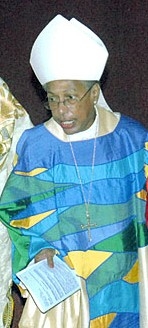Religious leader Barbara Clementine Harris was born in Philadelphia, Pennsylvania to Walter and Beatrice (Price) Harris on June 12, 1930. After graduating from the Charles Morris Price School of Advertising and Journalism, she joined Joseph V. Baker Associates, Inc., a black-owned public relations firm in Philadelphia. She became president of the company in 1958 but left ten years later to become director of the Community Relations Department of the Sun Oil Company.
Meanwhile, Harris, an Episcopalian, was a volunteer at her church and in local jails and prisons. In 1960 she joined the activist Church of the Advocate in North Philadelphia. That church had become a center for the civil rights movement evolving in Philadelphia, supporting both local protests and the national movement. Harris led a church delegation that marched with Dr. Martin Luther King in Selma in 1965. Three years later, the church hosted a national convention of the Black Panther Party (BPP), which attracted ten thousand people.
Meanwhile, Harris remained active locally, assisting the poor in a “soup kitchen” and in orphanages, including one she helped to desegregate. Despite her church leadership she noted that the national Episcopal Church discriminated against women in its own ranks. As late as 1970 they could become deacons, but not priests. Harris and others opposed this policy.
In 1976, the Episcopal Church voted to admit women as priests. About the same time, Harris decided to study for the priesthood. She left her job at Sun Oil to devote full time to her religious training. After completing a seminary course, in the evenings, on weekends, and on vacations, Harris was ordained a priest in October 1980.
Harris served as priest-in-charge of St. Augustine of Hippo Church in Norristown, Pennsylvania from 1980 to 1984. She was also a chaplain in the Philadelphia County prison during those years. In 1984, she was named executive director of the Episcopal Church Publishing Company. There she gained national notice as columnist, editor, and publisher of The Witness, an independent, liberal, church periodical. In her writings, Harris attacked all forms of racial, economic, and political injustices. Harris was also a member of the Union of Black Episcopalians and president of the Episcopal Urban Caucus.
In 1988, Anglican bishops from throughout the world met in Canterbury, England for the Lambeth Conference, the once-a-decade gathering of the international Anglican hierarchy. They agreed, over strong objections of many conservatives, to leave the question of the ordination of female bishops up to each national church. On September 24, 1988, the U.S. Episcopal Church voted by a slim margin to elect Barbara Harris Bishop of the Episcopal Diocese of Eastern Massachusetts, where she had moved in 1984. On February 11, 1989, Barbara Harris was consecrated a bishop, the first woman to be ordained in the worldwide Anglican Church.
As bishop, Harris continued to advocate for diversity in the Episcopal Church and the entire Anglican community. Her command of a 96,000-member Boston-based diocese made her a powerful voice in deciding church policy and programs. Nonetheless she remained an activist critic of the status quo.
Bishop Barbara Harris retired on November 1, 2002, but she continued to work, volunteer and preach. From 2002 to 2007 she served as an assisting bishop for the Diocese of Washington (D.C.). She published her memoir, Hallelujah, Anyhow! in 2018. Bishop Harris passed away in Massachusetts on March 13, 2020. She was 89 years old.

